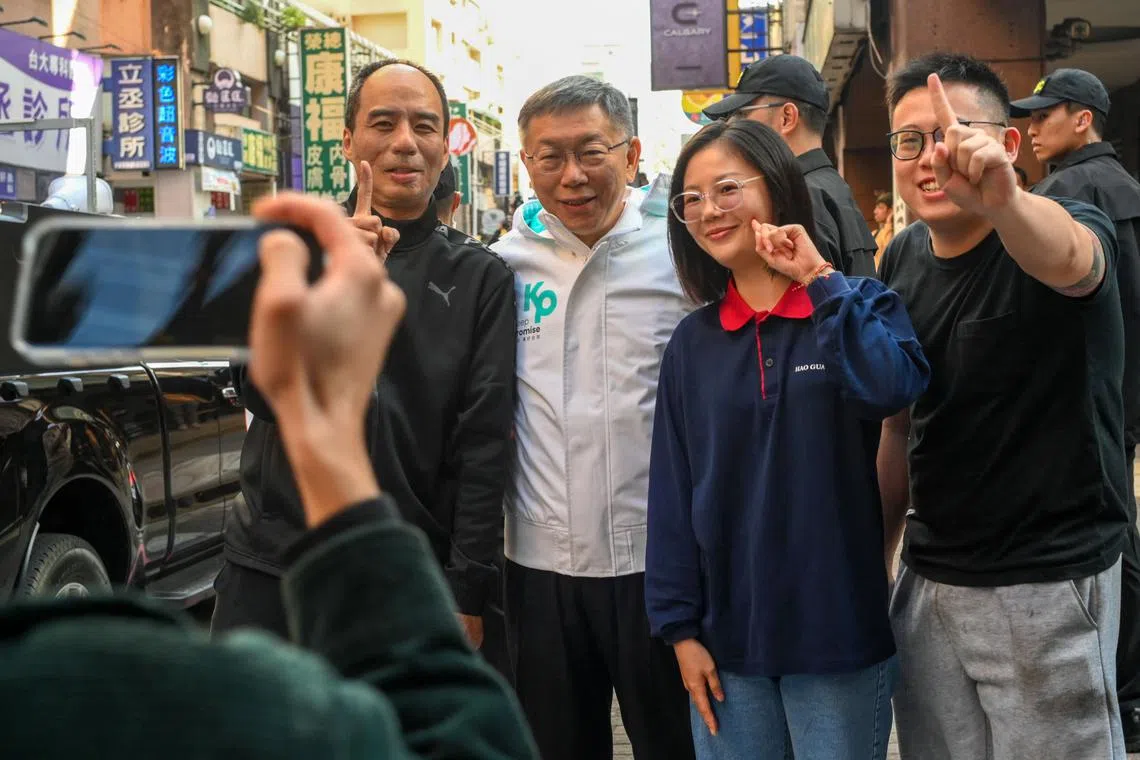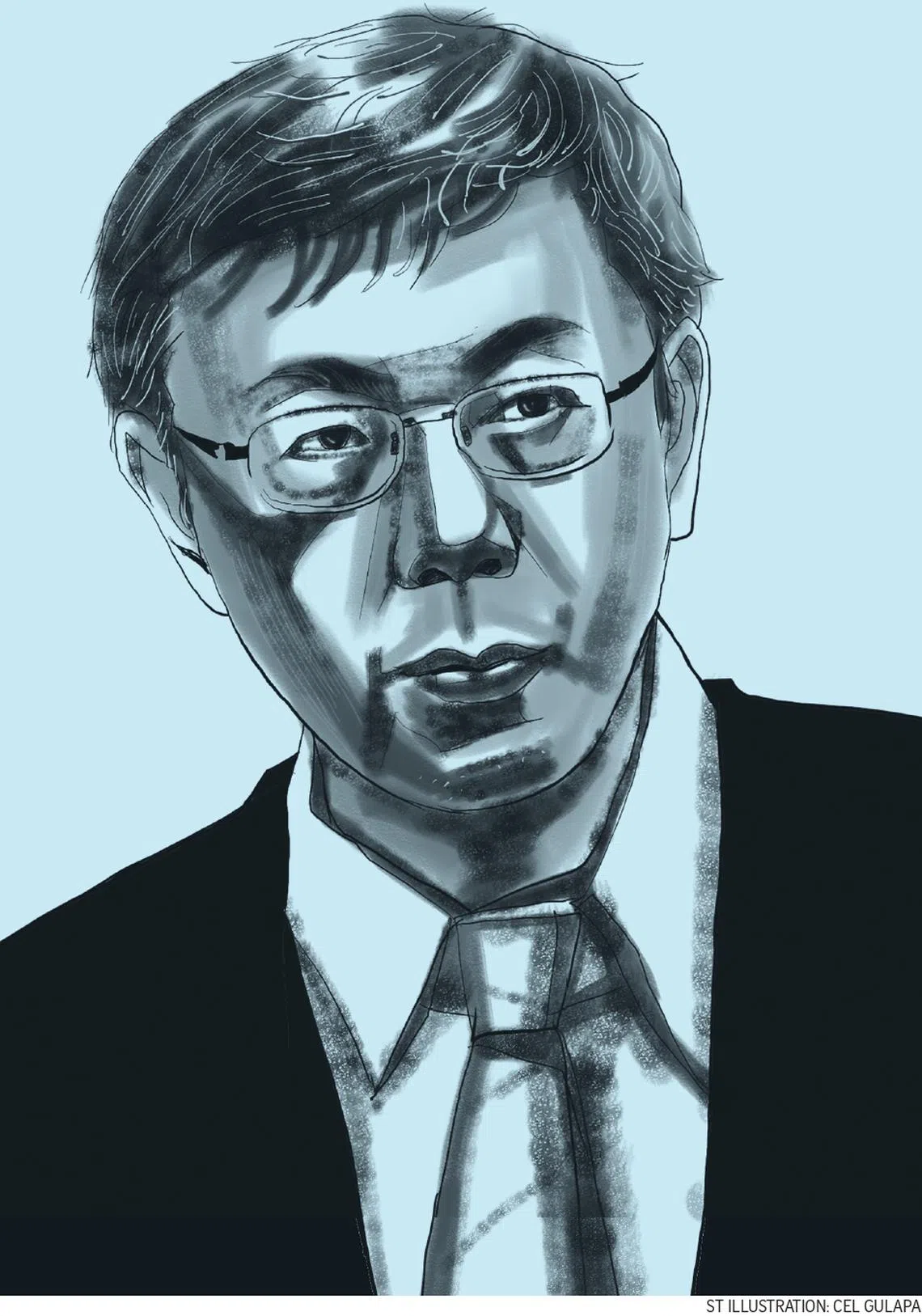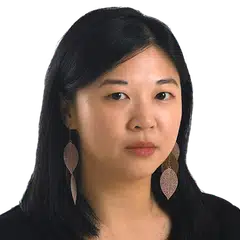Ko Wen-je, the improbable politician popular with young Taiwanese voters
Sign up now: Get insights on Asia's fast-moving developments

Taiwan People’s Party presidential candidate Ko Wen-je (second from left), a former surgeon, hung up his medical coat to enter politics 10 years ago.
PHOTO: AFP
TAIPEI – In a political landscape long dominated by two parties, a surprisingly viable third force has emerged in Taiwan in the form of a socially awkward father of three with a penchant for courting controversy.
Known for being brash and candid – though some would say offensive – Taiwan People’s Party (TPP) presidential candidate Ko Wen-je is far from your typical politician.
Yet, the 64-year-old former surgeon, who hung up his medical coat to enter politics in 2014, has managed to attract hordes of loyal, and typically younger, fans attracted by his straight-talking ways and savvy social media campaign strategy, which includes a viral music video of him rapping.
Mostly, though, his supporters have grown weary of Taiwan’s traditional two-party political system.
For more than two decades since 2000, power has alternated between the incumbent Democratic Progressive Party (DPP), which leans towards independence for Taiwan, and the main opposition Kuomintang (KMT), which favours closer relations with Beijing.
For Dr Ko, the two parties represent extremes in the way they handle cross-strait relations, one of the key issues in every presidential election in Taiwan. China looms large in Taiwanese politics because it claims the self-ruled island as its territory to be reunified with the mainland one day, by force if necessary.
Dr Ko argues it is his party, which he formed in 2019
“The DPP always takes a very confrontational attitude (with China), while the KMT is always thinking about cooperation with China,” he said during a televised presidential debate on Dec 30.
“We have to cooperate when necessary, but also confront when necessary,” he added.
Depending on who you ask, though, the bespectacled grey-haired man either represents the long overdue change that Taiwan needs or is a political chameleon who cannot be trusted.
“Young people used to flock to the DPP, but the party that was once considered anti-establishment is now the establishment,” said Assistant Professor Ma Chun-wei of Tamkang University in New Taipei City.
“Ko has benefited from the frustration of young voters who feel like the two bigger parties are out of touch and do not understand their needs,” he added.
But Associate Professor Chen Shih-min, a political scientist at National Taiwan University, noted how Dr Ko is “often vague and self-contradictory”.
“That could work in his favour because voters can take away from him what they choose to see,” he said. “He changes tunes to suit the situation – just look at his political history.”
Dr Ko burst onto the political scene in 2014 when he ran for the coveted Taipei mayoral seat as an independent candidate, although he received the backing of the DPP, which chose not to field a candidate.
Despite having no political experience, the high-flying trauma surgeon won by a landslide, beating the candidate from the KMT in its traditional stronghold.
His popularity was largely credited to his vocal support for the student-led Sunflower Movement that year, which was formed in protest against a controversial trade pact with China proposed by then President Ma Ying-jeou of the KMT.
Describing himself as a member of the “green camp” at the time – in reference to the DPP’s party colour – Dr Ko would go on to endorse the DPP’s Tsai Ing-wen when she ran for president in 2016.
But his politics gradually began to shift.
Within two years, his increasingly Beijing-friendly rhetoric put him firmly in the “blue camp”, a reference to the KMT’s party colour.
As Taipei mayor, for instance, he helmed annual city-to-city exchanges with Shanghai, during which he repeatedly said the “two sides of the Strait are one family”. The controversial remarks echoed language used by Chinese President Xi Jinping in his push for China’s reunification with Taiwan.
In 2018, Dr Ko won re-election as Taipei mayor by a slim margin against the KMT’s candidate, after the DPP entered its own candidate in the race.
“It was very surprising to everyone when Ko moved so far from the green to the blue – to the point where he nearly formed a joint presidential ticket with the KMT during this election season,” said Prof Chen.
“As someone whose own family had suffered at the hands of the KMT, that would usually be unimaginable,” he added.

Dr Ko Wen-je burst onto the political scene in 2014 when he ran for the coveted Taipei mayoral seat as an independent candidate.
ST ILLUSTRATION: CEL GULAPA
Dr Ko’s grandfather, a school principal, was tortured and beaten badly for a month by the KMT-led government in 1947 during what is known as the 228 Incident, an anti-government uprising. He died three years later, reportedly from injuries suffered in the event.
Previously, Dr Ko has also said that the things he hates the most are “mosquitoes, cockroaches and the KMT”.
Yet, hours away from the Nov 24 deadline to register candidates for the Jan 13 race, Dr Ko and the KMT’s candidate Hou Yu-ih were still negotiating a potential joint bid. It eventually fell through
Despite the apparent flip-flopping in Dr Ko’s politics, university student Lin Yin-hsuan is willing to give him a chance on voting day.
“Taiwan has given enough opportunities to the other two parties. Why not let Ko have a go?” the 23-year-old said.
He added that the other two candidates often use political jargon, which makes little sense to him. “Ko always gets straight to the point.”
Indeed, Dr Ko is known for his pithy remarks – though some have got him into trouble.
For instance, he has been criticised several times in the past for making sexist remarks, including comments at a 2018 forum that Taiwanese women who do not wear make-up “go outside and scare people”.
But TPP legislative candidate Jennifer Lee Yo-yi, 33, defended her party chairman, arguing that he has become “much more diplomatic” in a way that is worthy of a president.
“He is always willing to take advice and learn from past experience, which is not the case for other politicians who never change,” she told The Straits Times.
“Ultimately, he just wants to get things done and offer a new way forward for Taiwan.”



